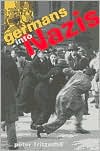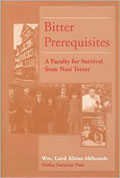Life and Death in the Third Reich
By Peter Fritzche
Recognition of Excellence Award at the 2008 Cundill International Prize in History at McGill University
On January 30, 1933, hearing about the celebrations for Hitler’s assumption of power, Erich Ebermayer remarked bitterly in his diary, “We are the losers, definitely the losers.” Learning of the Nuremberg Laws in 1935, which made Jews non-citizens, he raged, “hate is sown a million-fold.” Yet in March 1938, he wept for joy at the Anschluss with Austria: “Not to want it just because it has been achieved by Hitler would be folly.”
In a masterful work, Peter Fritzsche deciphers the puzzle of Nazism’s ideological grip. Its basic appeal lay in the Volksgemeinschaft—a “people’s community” that appealed to Germans to be part of a great project to redress the wrongs of the Versailles treaty, make the country strong and vital, and rid the body politic of unhealthy elements. The goal was to create a new national and racial self- consciousness among Germans. For Germany to live, others—especially Jews—had to die. Diaries and letters reveal Germans’ fears, desires, and reservations, while showing how Nazi concepts saturated everyday life. Fritzsche examines the efforts of Germans to adjust to new racial identities, to believe in the necessity of war, to accept the dynamic of unconditional destruction—in short, to become Nazis.
Powerful and provocative, Life and Death in the Third Reich is a chilling portrait of how ideology takes hold.
Purchase on Amazon.com or Barnes & Nobles
Germans into Nazis
By Peter Fritzche

Why did ordinary Germans vote for Hitler? In this dramatically plotted book, organized around crucial turning points in 1914, 1918, and 1933, Peter Fritzsche explains why the Nazis were so popular and what was behind the political choice made by the German people.
Rejecting the view that Germans voted for the Nazis simply because they hated the Jews, or had been humiliated in World War I, or had been ruined by the Great Depression, Fritzsche makes the controversial argument that Nazism was part of a larger process of democratization and political invigoration that began with the outbreak of World War I.
The twenty-year period beginning in 1914 was characterized by the steady advance of a broad populist revolution that was animated by war, drew strength from the Revolution of 1918, menaced the Weimar Republic, and finally culminated in the rise of the Nazis. Better than anyone else, the Nazis twisted together ideas from the political Left and Right, crossing nationalism with social reform, anti-Semitism with democracy, fear of the future with hope for a new beginning. This radical rebelliousness destroyed old authoritarian structures as much as it attacked liberal principles.
The outcome of this dramatic social revolution was a surprisingly popular regime that drew on public support to realize its horrible racial goals. Within a generation, Germans had grown increasingly self-reliant and sovereign, while intensely nationalistic and chauvinistic. They had recast the nation, but put it on the road to war and genocide.
Purchase on Amazon.com or Barnes & Nobles
Bitter Prerequisites: A Faculty for Survival from Nazi Terror
By William Laird Kleine-Ahlbrandt

A dozen Purdue University Jewish faculty members-10 men and 2 women- who were forced to flee their homes in Germany, Austria, Czechoslovakia, Poland, and Hungary during the Holocaust, tell their stories in a series of interviews conducted by Kleine-Ahlbrandt, a history professor at Purdue and the author of The Burden of Victory: France, Britain and the Enforcement of the Versailles Peace, 1919-1925 (1995). Some of the refugees were unable to escape and survived through hiding and subterfuge or endured the camps. The interviewees, some speaking out for the first time after more than half a century, often found it difficult to recall painful experiences. They discussed the problems of growing up Jewish, especially after the enactment of anti-Jewish legislation; the importance of religion, God, and traditions in their lives; and adjusting to life in the U.S., where finding employment was just one of many obstacles. The author complements the interviews with commentary for readers unfamiliar with the history of World War 1.
Purchase on Amazon.com or Barnes & Nobles


